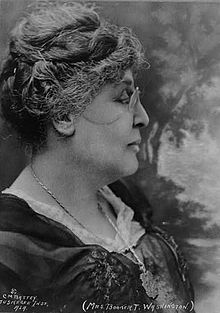Margaret Murray Washington
| Margaret Murray Washington | |
|---|---|

Washington in 1915
|
|
| Born |
Margaret Murray March 9, 1865 |
| Died | June 4, 1925 (aged 60) |
| Known for | anti lynching activism |
| Spouse(s) | Booker T. Washington |
Margaret Murray Washington (March 9, 1865 - June 4, 1925) was the principal of Tuskegee Normal and Industrial Institute, which later became Tuskegee University. She was the third wife of Booker T. Washington She was inducted into the Alabama Women's Hall of Fame in 1972.
She was one of ten children born to sharecroppers. Her father was of Irish descent and her mother was African American. Her father died when she was seven, and eventually was led to be foster raised by Quakers.
As a child Murray spent much of her time reading and quickly excelled in school. By the age of fourteen, she was so advanced in her studies that the school offered her a teaching position. Determined to further her teaching career, at the age of nineteen, Murray enrolled in Fisk University, where she completed the college preparatory course in five years and college in four.
It was at Fisk that Murray first met Booker T. Washington. Regarding her as a model student, Washington asked her to take over the position of Lady Principal, formerly held by his deceased second wife. By 1890, Murray was writing to Washington to express her deep feelings for him. He proposed the following year and, after some hesitation, Murray accepted Washington's proposal and they were married in 1893. Murray and Washington shared a home with Washington's relatives and his children from his previous marriage until "The Oaks", the homestead which was built for their family was constructed in 1901. Washington was reluctant to share his feelings with Murray, and often left her to tend his children while he was away on business. Though Washington never got over the loss of his first two wives, he believed that Margaret provided a well-ordered household, and the two were generally happy with their marriage. Margaret wrote Washington's speeches and she helped her husband in expanding the school and traveled with him on his tours and speaking engagements.
During her tenure as Lady Principal of Tuskegee, she also created the Tuskegee Woman's Club and merged local organizations with women clubs to help improve the values and liberation of womanhood in African American women of the Jim Crow south. In 1895 she gave an influential speech titled "Individual Work for Moral Elevation" at the First National Conference of the Colored Women of America. She is credited with co-founding the National Association of Colored Women in 1896 She founded country schools, taught women how to live and attend to their homes, worked for the improvement of prisons, started the Mt. Meigs school for boys and an industrial school for girls at Tuskegee, and constantly worked for the betterment of the poor and neglected. In 1912, she became the fifth president for the National Association of Colored Women.
...
Wikipedia
